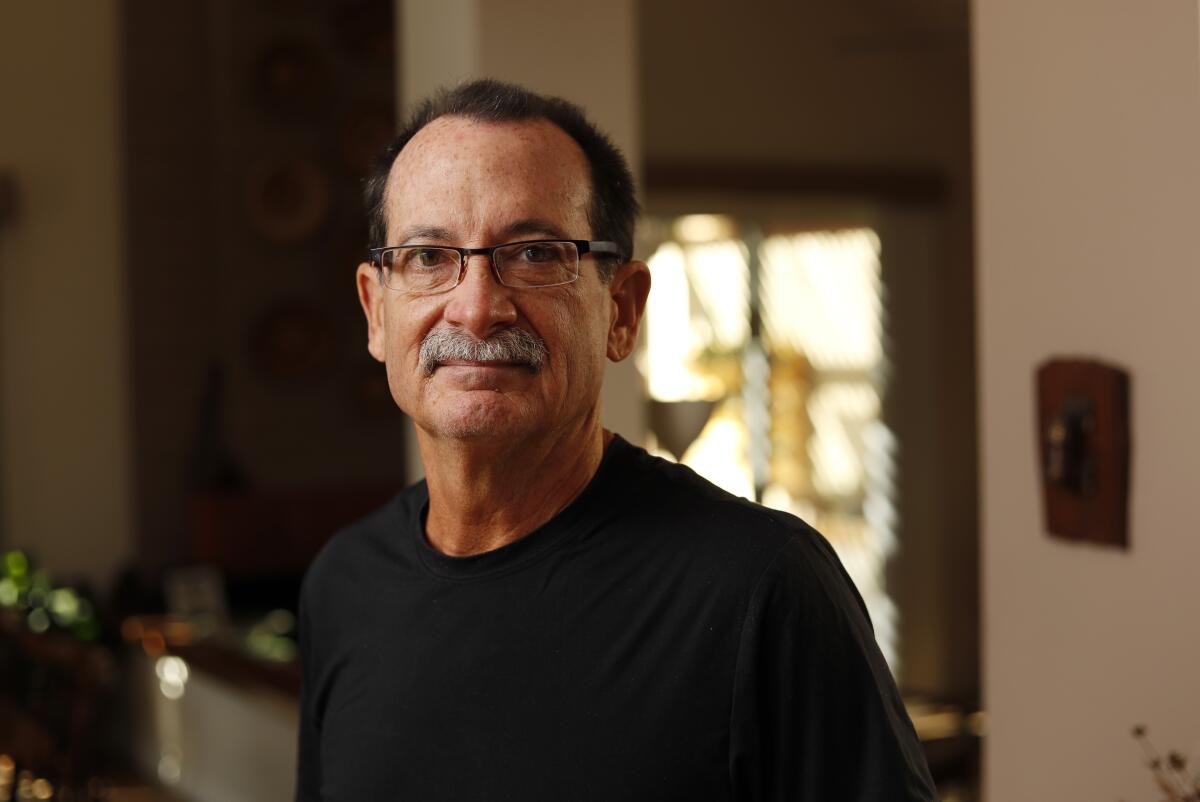South Korea returns a San Diegan’s 40-year-old favor with a COVID-19 ‘survival box’

- Share via
SAN DIEGO — Forty years ago, Paul Courtright went to South Korea as a Peace Corps volunteer, helping a developing country find its footing after decades of foreign occupation, poverty, disease and war.
Last month, with the United States reeling under a surge in coronavirus cases, South Korea returned the favor. It sent “COVID-19 survival boxes” to Peace Corps alumni in the U.S.
When his box arrived at the San Diego home he shares with his wife, Courtright found 100 masks, antimicrobial gloves, a folding fan, instant coffee, candy and silver chopsticks decorated with turtles (a symbol in Asian culture of good fortune and long life).
“The irony of having South Korea send us COVID-19 supplies and gifts is not lost on any of us,” Courtright said.
When he went there in 1979, at age 24, it was a country playing catch-up, industrializing rapidly but still dotted with impoverished rural communities. The one where he worked was a resettlement village for people with leprosy.
Courtright was a fixer who took people to doctor’s appointments on some days and made his rounds on the others, visiting villagers in their homes — “a lot of walking,” he said — to check on foot and hand ulcers and to make sure they were taking their medication properly.
“My village was poor — many homes still with roofs made from thatch,” Courtright said. “Yet the people used to bring me eggs, sweet potatoes and rice. They looked after me. Now, 40 years later, this same country is sending us a box to say ‘thank you’ — incredible.”
The survival kit came with a letter, too, from the president of the Korea Foundation, the diplomacy arm of the government’s Ministry of Foreign Affairs.
“Thanks in no small part to the help received from the Peace Corps,” the letter said, “Korea has since achieved an economic breakthrough.”
In 1964, as measured by its gross domestic product, South Korea was among the poorest countries in the world. Now it’s one of the richest.
South Korea’s response to the coronavirus outbreak — aggressive testing, contact tracing and isolation — has been considered top-notch, too, even as it deals with its own recent increase in cases. Since the pandemic began, the country has reported about 49,000 infections and 674 deaths.
In contrast, the U.S. has seen more than 17.8 million cases and over 317,000 deaths.
The Peace Corps program was started in 1961 by President Kennedy with the stated goal of promoting world peace; volunteers work in education, healthcare and other areas. Now on hold because of the pandemic, the Peace Corps has deployed more than 235,000 volunteers to about 140 different countries throughout its history.
After he got a bachelor’s degree in education from Boise State University, Courtright signed up for the Peace Corps, which asked him if he would go to South Korea and help leprosy patients.
He didn’t know anything about leprosy, an infectious disease that mostly causes nerve damage and skin lesions and was once thought to be so contagious and incurable that its victims were sent into isolation in leper colonies on islands and in remote places.
Doctors have learned it doesn’t spread easily and is treatable, but stigma still surrounded the patients in Korea, Courtright found when he arrived there after three months of Peace Corps language training. And he noticed something else — about 10% to 15% of the patients were blind.
“I was amazed by the different eye complications that they had,” he said. He started taking a four-hour bus ride every Monday to a hospital where an ophthalmologist treated leprosy patients. He took what he learned back to his village of about 600 people, and then to other resettlement communities.
And then he turned it into his life’s calling.
When his two-year Peace Corps assignment was over, Courtright returned to the United States and got a master’s degree from Johns Hopkins University and a doctorate from UC Berkeley in public health. Then he set about trying to prevent blindness, mostly in Africa, where he and his wife, Dr. Susan Lewallen, founded the Kilimanjaro Center for Community Ophthalmology.
“Korea taught me many things, and it gave me my career,” Courtright said. “I always felt it had given me far more than I had given it.”
That, he said, made the “survival box” all the more touching.
Courtright was so moved he emailed a thank-you letter to Geun Lee, president of the foundation that sent the box. “You should be proud of the beautiful, enchanting, fascinating, and welcoming country you call home,” he wrote.
Lee quickly emailed him back.
“Though decades have passed, the country where you spent years of your cherished youth has not and will not forget that affection,” he wrote. “We return it and will continue to pass it down from generation to generation.”
Wilkens writes for the San Diego Union-Tribune.
More to Read
Sign up for Essential California
The most important California stories and recommendations in your inbox every morning.
You may occasionally receive promotional content from the Los Angeles Times.














